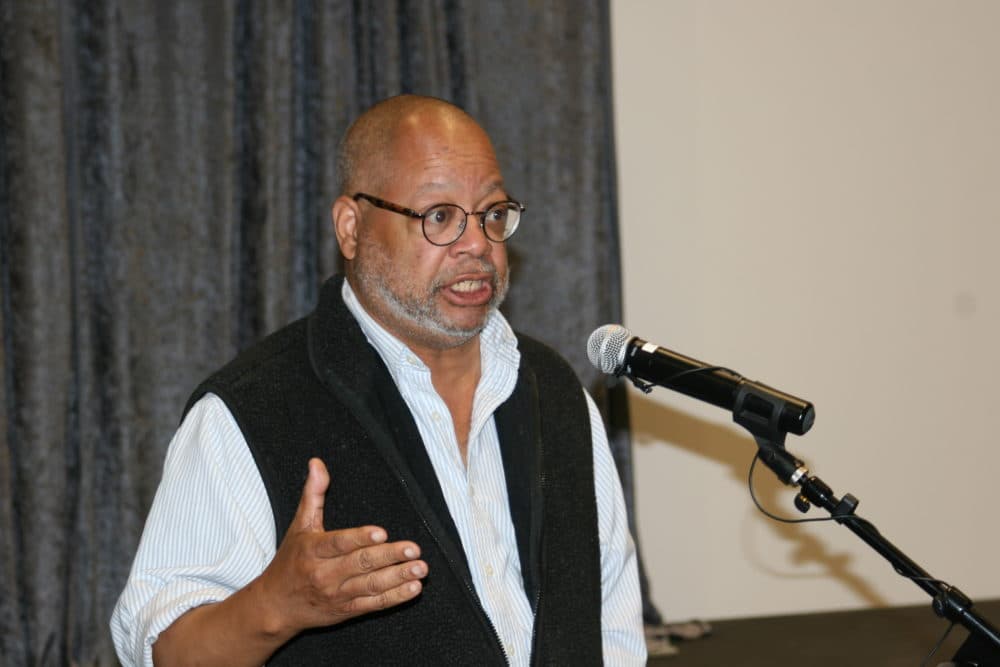
One word that comes up again and again as people remember Gregory Diggs is "community."
"He’s just a community person, an activist, passionate about racial justice and community and family," his brother Brian Diggs said. "Those are just broad terms but those are the first things that come to mind."
"[He's] somebody who has this big heart and really cares not just about his home but the whole community, not just Stapleton but Denver at large," said Tamara Banks, an independent documentary filmmaker and a freelance journalist who worked with Diggs. "And he didn’t have to. He didn’t have to care."
Diggs died over the weekend at the age of 55 of causes that as of Monday afternoon have not been made public, leaving his ex-wife, two children, two brothers and a legacy of advocacy in Denver.
"He was more than a soldier, you know? He was a general. And a kind, loving person. He was so generous with his time, with his energy, with his love," Rebekah Henderson, his business partner and Off Color podcast cohost, said. "He really loved his community and he was involved in so many things and he connected so many people together. Things revolved around him, you know? People were drawn to him and he would do anything for anybody."
His work began long before he came to Denver.
In fact, his interest in diverse, inclusive and unified communities started during his Silver Spring, Maryland, childhood.
"Any community — he’s pretty much active in it," his brother said. "He was on the high school reunion committee. It was very important for him to keep in contact with diverse groups within the school and make sure they were all represented.
"The diversity thing was happening even in high school. One of the interesting things — he remembers that it was new for the white students and the black students to be together. His class was the first class, I think, in the junior high school to bring those groups together and make sure it was all one dance. And he was making sure that the reunions were diverse and together."
In college, he was president of his Tennessee State University chapter of Alpha Phi Alpha, same as his father, and he remained active throughout his life, Brian Diggs said, in part because it was an opportunity to be a mentor.
Diggs and his now ex-wife, Alyson Shupe, came to Colorado along with their young daughter, Clarke (22), after Shupe completed her Ph.D, his brother recalls. They were about to have a second child — their son Langston, now 18 — and Shupe's parents were here. Diggs was also working on his own Ph.D. in philosophy at the University of Colorado Boulder.
In Denver, Diggs became a powerful voice for his community.
And community, for Diggs, meant a lot of different things. It meant Stapleton, where he was one of the first residents -- and one of the leaders of the movement to change the name. It meant northeast Denver, where he helped start Northeast Denver Neighbors For Racial Justice. It meant all of Denver, where he taught at CU and led frank discussions about race at public libraries. And it meant among his friends, who say he was always there for them.
"He just showed up for everybody," said Geneveive Swift, another leader in of Rename Stapleton For All. "I can’t tell you how many ways he showed up for me and people I love, just ‘cause. He was so well connected, he was so smart and caring and genuine. He not only wanted to help but he had the skill set to do it and he made the time.
"I don’t know how there were enough hours in the day to connect with as many people and check in on as many people as he did."
By her count, this is what he had on his plate: Rename Stapleton For All, Northeast Denver Neighbors For Racial Justice, supporting Ditch the Ditch, remaining active in Alpha Phi Alpha, mentoring black youth, recording the Off Color podcast, hosting his "Am I Racist?" talks at the library and the Black Panther Project.
On top of all that, he'd still find time to do things like watch Henderson's kids. He spent Thanksgiving with her family the first year after her mother passed away.
The two met when Diggs saw a post of Henderson's on Nextdoor attracted some "crazy stuff" because she's mixed race, she said. They eventually met in person through a mutual friend and got his library program started. He helped her with her film project "All Mixed Up: Our Changing Racial Identities," and they started their own company and their own podcast, Off Color.
At the heart of Off Color is a sensibility and talent so many people saw in Diggs — a natural ability to be amiably blunt.
"We feel like people are too polite about it and we never get anywhere," Henderson said of racism discussions, particularly those in which we worry about upsetting white people. "We wanted to push hard to help move things forward."
Banks, who had been meeting with Diggs since September of last year to discuss the movement to rename Stapleton, saw the same knack for communication.
"He has a great way of talking about thoughts and concepts and nuances in ways that aren’t threatening to people, but in a way that he’s really clear about his feelings," she said. "What a great opportunity, to work with somebody so clear-headed and thoughtful."
"His laugh is the first thing comes to mind," Brian Diggs said when asked what stood out about his brother. Banks recalls a smile "like a little cherub."
Jacqueline St. Joan, another leader in Rename Stapleton For All, described him as "a tender, tender-hearted person" and "an angel, but he's devilish, too."
"Greg was a funny guy," she said "He’s kind of gentle and ferocious person."
As an example, St. Joan and Swift both recall a poem he recently wrote and shared, "The Good Negro."
"That poem is very powerful and sort of says it all in that he is a Ph.D, an educated man who has played by the rules his whole life and made a family and made a home and raised kids and is beloved by his students," St. Joan said. "He was willing to cast off the protection and privileges that go with what he would call being 'a good negro' to, as he would say, agitate or stir the pot, stir things up a little bit to get people to pay attention and not be so complacent."
Swift saw it as a moment of unapologetic honesty, just the kind of thing he was known for. It wasn't without consequences, she points out — there were negative reactions that hurt his feelings — but it was important.
"He was finally saying, 'You know what? This is really important and I’m not going to wait anymore. I’m not going to wait for you to take your time. This stuff is happening and I’m not going to wait anymore.'"
The memory that St. Joan says will really stick, though, is a softer one. At a Rename Stapleton For All meeting, Swift had big news and wanted to wait for Diggs to arrive to deliver it, "to give him this as a gift." The 29th Avenue Town Center had taken the Stapleton name off its sign.
"When she told Greg that, I happened to be sitting across from him. He was choked up," she said. "He was fighting back tears."












